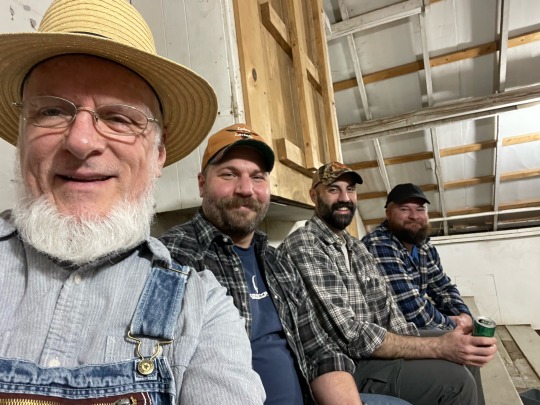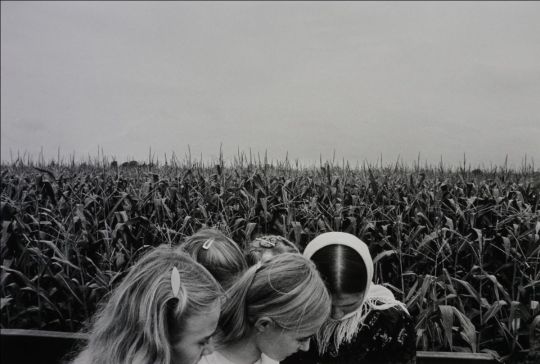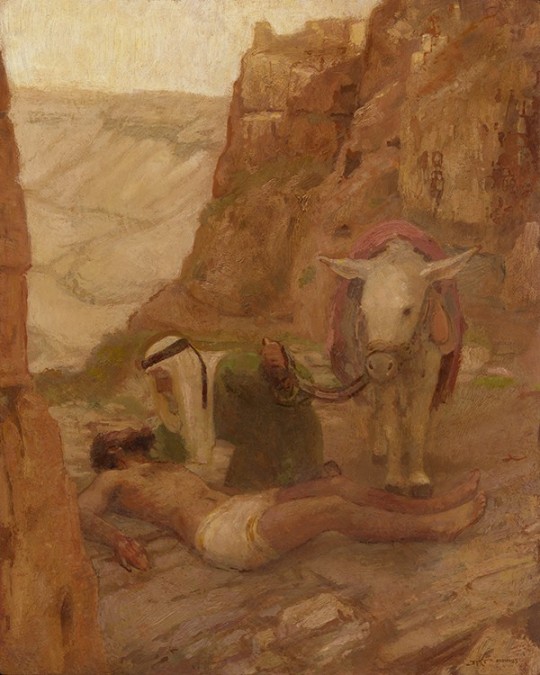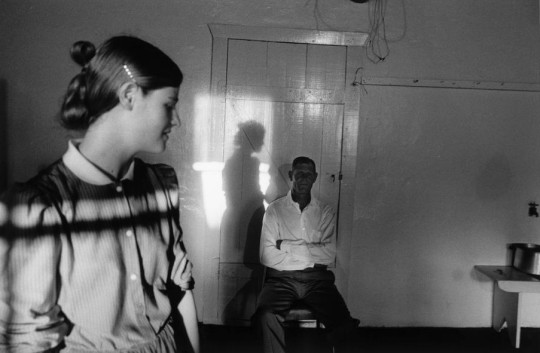#mennonites
Text




Saturday afternoon at the Rockville Livestock Auction. Think we’ll definitely be back for some baby goats!
#rural life#farm life#me#clown husband#livestock auction#country life#farm folk#Amish auctioneer#mennonites
86 notes
·
View notes
Text

Lambton County, Ontario, Canada. 1990. From 'The Mennonites'
Photo: Larry Towell
38 notes
·
View notes
Text

Photographer Jake Michaels
95 notes
·
View notes
Photo

(via We're doing Mennonites having fun today. Bass Pro Shop, upstate NY. (OC) : pics)
213 notes
·
View notes
Photo

Mennonites in Mexico by municipality, 2020.
74 notes
·
View notes
Text


Left: The Good Samaritan: He Had Compassion, by J. Kirk Richards, 2014.
Right: Icon of Dirk Willems, by Jivko Donkov
[In] the parable of the Good Samaritan […] the people who fail to do good, who proved callous, were the priest and the Levite, who were more concerned with respecting their religious traditions than with coming to the aid of a suffering person. The one who demonstrates what it means to be a "neighbor" is instead a heretic, a Samaritan. He draws near, he feels compassion, he bends down and gently tends the wounds of his brother. He is concerned for him, regardless of his past and his failings, and he puts himself wholly at his service. Jesus can thus conclude that the right question is not: "Who is my neighbor?" But: "Do I act like a neighbor?" Only a love that becomes gratuitous service, only a love that Jesus taught and embodied, will bring separated Christians closer to one another. Only that love, which does not appeal to the past in order to remain aloof or to point a finger, only a love which in God's Name puts our brothers and sisters before the ironclad defense of our own religious structures; only that love will unite us.
Pope Francis, Homily on the Solemnity of the Conversion of Saint Paul, given January 25th, 2024.
(Today, May 16th, marks the 455th anniversary of the death of Dirk Willems, Anabaptist martyr who nearly escaped execution at the hands of officials of the Catholic Church, but who stopped to save the life of one of his pursuers even though it meant he would certainly be recaptured)
#Christianity#Catholicism#Mennonites#martyrs#saints#Dirk Willems#My Pope#Parable of the Good Samaritan#compassion#love#charity#agape#ecumenicism#J. Kirk Richards
12 notes
·
View notes
Text
I can't find the post where I said Mennonites were a cult like the Amish, but I remember someone replied with, "Hey, that's not correct" but with a bit more explanation.
Anyway, I can't find the original post to reblog and correct myself, so I just wanna say somewhere that I was wrong about Mennonites shunning and threatening shunning to anyone who is going to leave. It does happen, but it's not absolutely universal the way it is with the Amish, the Mormons, or with the Fundamentalist Christians.
When speaking of cults vs. religions, I think it's very important to double check these things because understanding if someone is going through a cult experience vs. a shitty church experience can be very, very different.
Like, the Catholic church on paper (and on twitter) is just a pile of shitbags. But there's also a lot of Catholics who loudly speak out about fucked up church doctrine and other fucked up church practices. That's not a cult. That's a bad church experience. You get me?
Looking at the wiki article, which is wonderfully detailed, I see the reason I thought all Mennonites practiced excommunication is because I grew up near Old Order Mennonites, who DO practice excommunication. But they are just one of many variations on the practices. Lots of schisms went down over time.
So, I was wrong. Old Order Mennonites? They use excommunication and shunning. Those are cult behaviors. But many Mennonites do NOT do that. It's an important distinction.
#mennonites#religion#cults#things i learned#to whoever replied to that post from months ago#sorry it took so long to read up#but thanks for letting me know i should
17 notes
·
View notes
Text

Larry Towell, Mennonites, Chihuahua, Cuauhtemoc Colonies, Mexico, 1992
101 notes
·
View notes
Text
At midday on the road into Grünland, a Mennonite colony in the Bolivian department of Beni, the only sound is a distant chainsaw.
On either side, strips of deforested land extend into the distance. Underfoot, the soil is scattered with shards of ceramic and bone: remnants of the pre-Columbian peoples that this part of the Bolivian Amazon, known as the Llanos de Mojos, once supported.
Archaeologists are only just beginning to understand the scale and complexity of these societies, but all the while, the agricultural frontier keeps advancing, destroying sites before they can be studied. The environmental damage of deforestation is well-known, but the Llanos de Mojos reveals another side of its impact: the loss of human history.
Grünland was founded in 2005 by Mennonites, members of the tightly-nit Anabaptist Christian group that began arriving in South America in the early 20th century, in search of isolation and lands to cultivate.
In one field, a Mennonite man called Guillermo was resting in the shade of his tractor. He cheerfully acknowledged finding ceramics and bones while working the land.
Umberto Lombardo, an Italian earth scientist and one of a handful of academics who study the archaeology of Beni, probed gently with questions about the topography of the land when it was first deforested.
The Llanos de Mojos is an almost completely flat region, so any elevated areas are a sure sign of human activity. Lombardo walked about, stopping here and there to pick pieces from the earth of what was once a vast human-made mound, now partly flattened by the farmers.
“The surface of the site is completely destroyed, changed, because the earth has been moved, the pottery broken,” said Lombardo. “That part of the archaeological archive is lost.”
The Mennonites are just one facet of Bolivia’s booming agribusiness, and what is happening in Grünland is happening all over Beni.
The Bolivian government has big plans for the sector. Today, the country has roughly 4m hectares of cultivated land and 10 million cattle. By 2025, the government wants 13m hectares and 18 million cattle.
On the current trajectory the government will undershoot those targets substantially. Nonetheless it has boosted the sector’s growth by allowing more deforestation and reducing fines for illegal deforestation.
In 2021, Global Forest Watch placed Bolivia third in the world for loss of primary forest, behind Brazil and the Democratic Republic of Congo. Ranked by population, Bolivia is first by a distance.
Most of this deforestation is happening in two departments: Santa Cruz and Beni. But it is in Beni that a unique archaeological heritage is at risk.
“Archaeology is everywhere in Beni,” said Lombardo. “They say if you put up a roof, you have a museum.”
The Amazon basin was once considered to be pristine wilderness, but a growing body of research has found traces of a vast network of earthworks predating the arrival of Christopher Columbus in the Americas and implying the existence of large, complex societies.
#Bolivia#deforestation#archeology#pre columbian#beni#mennonites#I feel a bit awkward tagging it with that last one#apologies to the mennonites of tumblr I guess#but look it does have a distinctly doctrine of discovery flavor if you ask me#(I say that making some assumptions as to where Guillermo is from)#there is more active element of#colonization#going on as well#agriculture#ranching
45 notes
·
View notes
Text

It's my parents' wedding anniversary today, and this cracks me up every year. Hard-hitting news for the small-town newspaper!
13 notes
·
View notes
Note
Ok but like, what is a Mennonite?
Great question! I’d first like to preface that I am far, far from an expert on this; I go to and was raised in a Mennonite Church, but we are a little odd because we’re the only Mennonite church around (you often find several in a community) and we don’t uphold the typical dress code of head coverings and skirts. Also my mom was the daughter of an army chaplain, so because of her experiences growing up and being around people of many Christian groups combined, we are pretty comfortable with many denominations. Here are some basics, though:
Mennonites are part of the Anabaptist movement, which is largely noted (among other things) for believing that people should choose baptism as adults as a sign of their commitment to Christ, rather than be baptized as infants.
We do still do dedications, which is where the parents and baby go up front at church and oil is put on the baby’s head and the congregation verbally commits to helping raise the child to know the Lord - basically showing they plan to be a good and supportive church family for this new member and the family.
Another notable difference is peaceful noncombatance. Mennonites generally hold that using force is wrong and that we shouldn’t join the military because it divides our allegiance between God and our country. This is another one that my church, at least, is more relaxed on - at least one of our members is a police officer, and my brother wanted to join the national guard (he couldn’t due to a minor but chronic medical issue). Also, as mentioned, my grandpa (who was not a Mennonite) was an army chaplain. I support my brothers and sisters in Christ who choose military service, but I also respect those who feel they should stay apart from it (and count myself one of them).
Fun Fact: Mennonites and German Baptists and other Anabaptist denominations are often confused with Amish because we are all Anabaptists and we all have a tradition of the women wearing head coverings and old-fashioned-ish skirts/dresses. However, the Amish came after the Mennonites, and Mennonites aren’t against using electricity or owning technology and such. I wont speak further on that because I am even less of an expert on Amish customs. (I mentioned German Baptists because I see them frequently around where I live; I know little of their differences from Mennonites except their head coverings are typically a cute boxy shape instead of the flat lace circle traditional Mennonite women wear.)
These next ones are, I think, pretty common across many or most denominations, and they are what I consider the core tenets of faith in Christ:
Jesus Christ is the Son of God and part of the Trinity (the Father, the Son, and the Holy Spirit are all one God but are also distinct persons).
Jesus came to Earth as both fully man and fully God, He lived a sinless life and died on the cross to pay the debt of our sins so we could be reunited with God, and He rose from the dead to defeat the death that is the just punishment for our sin.
The Bible is the Word of God and it is true and good for guiding, teaching, comforting, and correcting.
We all have free will, and while God desires all people to be saved, the gift of salvation is freely offered, and we must choose to take it. We are saved by accepting Jesus as our Lord and Savior and asking forgiveness of our sins, accepting his payment of our debt.
We cannot “earn” our salvation through good works, but genuine faith in Christ should lead to doing good works as a demonstration of our love for Him and of His love for others.
The Holy Spirit is the one mediator between us and God, and we can ask the Holy Spirit to pray through us when we don’t know how to express what we want to pray. God always answers our prayers, even if the answer is “No” or “Wait,” and we can trust that His answers are for our good and His glory, even when we can’t see how from our limited perspective here on Earth.
I think that’s a decent summary, but let me know if you have questions or are interested in the Bible verses that support the different points. And thanks for asking!
26 notes
·
View notes
Text





tl;dr: "is there space for LGBTQ people in Christianity?" Her answer: "not unless you admit same sex feelings are inherently wrong."
This is a mennonite lady I follow so it's not like I'm shocked or expected a better answer, I just think her long, convoluted answer to this is a great example of how Christians who know homophobia is wrong try to plead their religion's case to people.
Step 1, reference every single passage that could support homophobia (even if it's they're from different translations, as @fuhndies pointed out) Step 2, point out other relationship/sexuality sins from the Bible directed at straight people to prove it's an even playing field, step 3 ramble apologetically about how we're ALL sinners to try and make LGBTQ people not feel so singled out and let them know that there is a path to salvation if they want it!!
I mean I know I'm just preaching to the choir w/ my particular audience but they do all this work to try and explain the homophobia away, like citing Bible verses is even a legitimate argument against discrimination. And it's just like remember when 99% of Christianity re-wrote their fucking Bibles to justify slavery (and rewrote them again when people stopped putting up with it) like I just don't understand how any Christian of any type feels like these kinds of arguments hold water at all for people any more.
Quoting verses from a book that's been edited and rewritten piece meal for thousands of years is never the flex you think it is, it means nothing. Not to secular people, not to Christians who have a different interpretation of the Bible, not to practitioners of other religions.
I guess what I'm saying is if you can't defend your discrimination with any logic or opinions that don't come from a Bible verse (and can't do it in 3 paragraphs or less) maybe it's not worth defending and you actually don't believe in it.
19 notes
·
View notes
Text
Submission Form
I think most of y'all kinda know the drill here. Submit as many denominations as you want (INDIVIDUALLY), but don't spam the form.
This poll is for PROTESTANT denominations and sub-denominations. Do not submit catholicism, JWs, or Mormons. This poll can also include "non-denominational" organizations so long as they have multiple churches and a distinct interpretation of faith. For example, the IBLP and the New Independent Fundamentalist Baptists can be submitted.
You can also submit denominations just because they suck and you want to see them beaten into the ground.
Here's the link. I'll be taking Top 32 make it into the bracket. The submission form will remain open until I feel that response is sufficient (so probably like 2000 responses).
#protestant#baptist#mennonites#amish#christian#christianity#christian denominations#bracket polls#pentacostal#anabaptist#evangelical#charismatic#lutheran#united methodist church#methodist#episcopal#seventh day adventist#quaker#religion#presbyterian#holiness church#jesus christ#jesus#kjvbible#christian discourse#ruleposting#196#r196#r/196#rule
4 notes
·
View notes
Photo




Since the 1800s, Old Colony Mennonites have conducted their lives far away from the rest of society. The most insular and conservative sect of the Mennonite Church, they reject mainstream schooling, speak Low German, adhere to strict, gendered dress codes, and shun modern technology.
Although cameras are also prohibited among the group, the photographer Larry Towell befriended, lived with, and documented Old Colony farming communities in rural Canada and Mexico throughout the 1990s, a time when many members were forced from their traditional agrarian lifestyles into exploitative migrant farm work and underpaid menial labor to feed their large families.
A newly revised book records Larry Towell’s decade among the Mennonites as they struggle to hold on amid changing times and hard luck.
10 notes
·
View notes
Quote
Unaccompanied on Sundays,
those hymns in four parts, our voices lift with such force
that we lift, as chaff lifts toward God.
Julia Spicher Kasdorf, from “Mennonites”
12 notes
·
View notes
